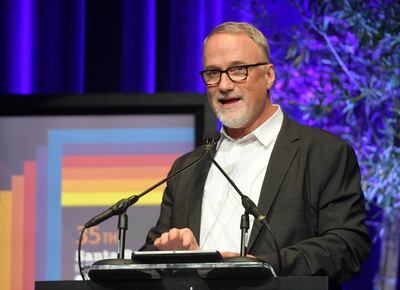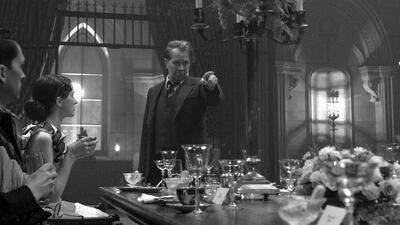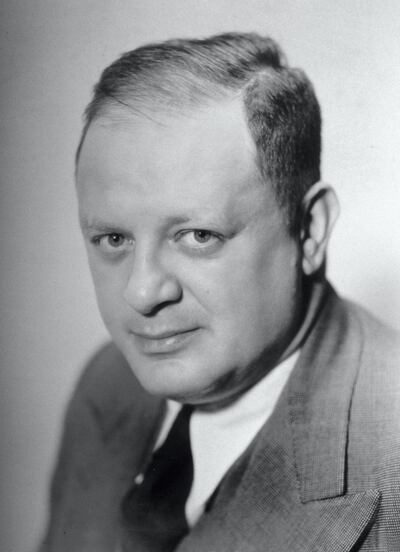David Fincher's new film Mank should be a major contender during awards season. It is an immersive, lovingly crafted, bittersweet dive into late 1930s Hollywood, and the circumstances that gave birth to one of cinema's crowning achievements, the film Citizen Kane.
Gary Oldman, who delivers a riveting central performance as Kane’s alcoholic screenwriter, Herman J Mankiewicz or “Mank”, describes Fincher’s latest effort as the work of “a master filmmaker”.
Speaking during a Q&A with the cast and director, Oldman says: “We talk about Coppola, Hal Ashby, Robert Altman, Kubrick, and in this generation, I know that at the very top of the list is Fincher.”
Fincher has built his reputation over time, on the back of films such as The Social Network, Se7en, Fight Club and Zodiac. So what he hoped would be one of his first movies – his journalist father Jack, who died in 2003, wrote the first draft of the screenplay 30 years ago – will now arrive on Netflix as his 11th.
“My father was retiring from writing magazine stories and he wanted a challenge,” says Fincher, recalling the start of the film’s long journey to the screen. “We had talked about Pauline Kael’s essay for many years, and I said, ‘Why not take a swing at the Herman Mankiewicz story?’ And he did.”

Fincher is talking about Kael's provocative 50,000-word Raising Kane essay, which he first read two years after being "amazed" by Citizen Kane as a 12-year-old in a film appreciation class at school. In it, the critic says that despite Mankiewicz and Orson Welles sharing a writing credit on Citizen Kane and, ultimately, an Oscar, it was the former who was the sole author. This was later disputed by the likes of filmmaker Peter Bogdanovich, who says the source for Kael's assertion was Welles' disaffected former friend and colleague John Houseman.
“I wanted to talk about collaboration,” says Fincher. “I wanted to talk about the kind of petting zoo that the process of cinema is, as opposed to this notion of this science experiment, and the personalities involved, and this was a really kind of wonderful sandbox.”
The film cuts between a behind-the-curtain look at the Hollywood studio system and the machinations of movie moguls in the mid-to-late 1930s and 1940, when Mankiewicz was recuperating from a car accident and writing what would become Citizen Kane. We see the growing tension between the writer and Welles (Tom Burke) as Mankiewicz goes from viewing himself as "washed-up" to realising his worth, and the way that press baron William Randolph Hearst (Charles Dance) and his younger lover, Marion Davies (Amanda Seyfried), became the models for Kane and his second wife.
Oldman dismisses any suggestion that you need to know Welles' classic to appreciate Mank. "Yeah it helps. You pick up on all the little Easter eggs David has put in there. But you learn who all the people are as it goes along. What would it be if you put 'Based on a True Story' on the front of The Godfather? Is it now a biopic? You don't have to be a cinephile to enjoy Mank."
In this era of fake news and “alternative facts”, something that may surprise many viewers is how MGM bigwigs Louis B Mayer (Arliss Howard) and Irving Thalberg (Ferdinand Kingsley), working with Hearst, used fabricated news reels to help tip the balance in the 1934 California gubernatorial election race between the Republican Frank Merriam and Democrat Upton Sinclair.
In the film, Mankiewicz unwittingly plants the idea in Thalberg’s head of using the studio’s power to persuade audiences to believe the unbelievable for political ends. However, his response to discovering his unintentional role in Sinclair’s defeat makes him grow in moral stature.
“We were looking for some way to dramatise Mank’s burgeoning pride and sense of accomplishment,” says Fincher, “so the Sinclair thing was there to say, ‘I say it here and it comes out there. My words are important and they can lead to things that I can either be proud of or they could lead to things I’m ashamed of.’”
Oldman will almost certainly be Oscar-nominated for his performance as the hard-drinking, hard-gambling, but righteous genius. To become Mankiewicz, he put on weight, but Fincher insisted that was where it ended. "I don't look like Mank, and I do like a wig and a false nose – I'm partial to a bit of make-up," jokes Oldman, who was unrecognisable as Winston Churchill in Darkest Hour.
Although challenging, it worked, he says, because there were “no tricks, no prosthetics, no padding. It’s just raw. And because of that, it was very freeing”.
Oldman is at the top of his game in a long scene where Mank drunkenly gatecrashes a dinner party at Hearst Castle and, at excruciating length, insults the host. According to Dance, it took 100 takes before the exacting Fincher was satisfied. (Years ago, Jake Gyllenhaal told me during a break from filming Zodiac that he was doing between 30 and 80 takes.)
Seyfried, who speaks volumes with silence as Davies, while her friend attacks her lover, remembers it well. “His monologue was, like, 17-pages long, and he nailed it every time,” she says, admiringly. “I didn’t sleep leading up to that scene because I was newly pregnant and feeling ill, and because I was terrified I wasn’t going to be able to bring it. That I wasn’t going to be present. I didn’t know how long I could sit there without vomiting. Turns out I could be there for hours without vomiting.” Expect Seyfried to also feature come the Oscars.
Finally, when asked whether he wanted to educate people with his detailed and unsentimental recreation of old Hollywood, Fincher says not as much as he hoped to entertain, but that he “certainly wanted it to feel like a movie of that period”.
“I wanted the transportive effect so that if you’re going to give us two hours and eight minutes of your time, then you’re going to get to see something that you wouldn’t otherwise get to see.”
Most people will agree that, much like his star, he nailed it.
Mank is on Netflix from Friday, December 4


